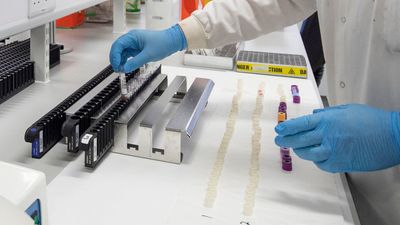7 African Countries Commit to Coronavirus Antibody Testing in Bid to Re-Open Economy
WHO has identified 7 African countries for coronavirus antibody testing to understand the extent of the Covid-19 outbreak on the continent.
Dr John Nkengasong, head of African Centre for Disease Control and Prevention, has reportedly announced a continental testing project in countries that have low test rates. Zimbabwe, Sierra Leone, Cameroon, Zambia, Nigeria, Morocco and Liberia have been selected as pilot groups to undertake the project. The selected countries have agreed and shown commitment to the announcement.
Antibody tests were first approved by the South African government in July this year. According to Medical Brief, these tests are different in that they test blood for antibodies that have formed as an immune response in individuals infected with coronavirus. Medically termed "Serelogy tests", they are useful in picking up evidence that a person had the virus even if they did not show symptoms. "Antibody serology tests, in general, are useful in establishing whether a person has acquired immunity to a virus and is also useful in testing whether or not a vaccine against an infectious disease is working," explained South African Health Products Regulatory Authority (SAHPRA).
Benefits of the tests are that they are mobile and easy to conduct; a drop of blood is collected through a finger prick, unlike the complicated rigorous test for coronavirus infection which requires a deep, uncomfortable, painful nasal cavity and throat swab.
These coronavirus antibody tests are also drastically less costly than typical coronavirus tests. Medical science experts and doctors have been previously recorded as stating that antibody tests are the "missing weapon" in combating coronavirus. Contradictingly, The South African Medical Journal has forewarned against the heroic belief in antibody tests as the science is more complicated and the presence of antibodies does not necessarily mean protection against reinfection or being contagious.
Read: 43 World Health Organisation Experts To Land in South Africa as Coronavirus Infection Rates Peak
Over one million coronavirus infections have been recorded in Africa, which is almost 10 percent of Africa's total population. South Africa leads in infection rate numbers, but that is because of the high number of tests.
WHO International Rescue Committee has analysed countries' response to the pandemic and have identified possible hotspots for coronavirus breakouts. Nigeria is of concern because of the rising infections which account for a third of Africa's total reported cases.
Political unrest in Zimbabwe is of concern as it affects coronavirus testing. While South Africa previously raised concern because of alleged under-reporting of coronavirus related deaths, coronavirus infection numbers are said to be steadily declining. South Africa reported a loss of over R5 billion in the economy due to the pandemic and Nigeria has reported millions of job losses.
Africa Centre for Disease Control and Prevention, reported from Adis Ababa that it is also monitoring the pandemic in Kenya, Ethiopia, Sudan, Zambia, Gabon, DR Congo, Ghana, Ivory Coast, Senegal, Egypt,and Algeria.
Nkengasong said a continental strategy was being developed to set up a consortium of clinical trials and then begin the procurement and financing of vaccines.- Several African Countries Will Begin Easing Restrictions of COVID ... ›
- Angélique Kidjo Reworks Classic Song 'Pata Pata' for COVID-19 ... ›
- Global Citizen's Announces More Artists to its Line-Up for 'One ... ›
- Rebuilding the Nigerian Fashion Industry After Coronavirus ... ›
- African Countries With Confirmed Coronavirus Cases - OkayAfrica ›
- Bobi Wine Offers to Airlift Mistreated Africans Out of China - OkayAfrica ›
- Op Ed: Africa is Not the Center of The Coronavirus Epidemic and the ... ›
- President Ramaphosa Eases Lockdown To Boost Economy ›
- President Ramaphosa Eases Lockdown To Boost Economy - OkayAfrica ›
- South African Health Minister Tests Positive for COVID-19 - OkayAfrica ›
- COVID-19 Concerns Increase as Zimbabweans Spend Second Week Queuing at Border ›
- South African Professors: Africa Has The Highest COVID-19 Death Rates in the World - OkayAfrica ›
